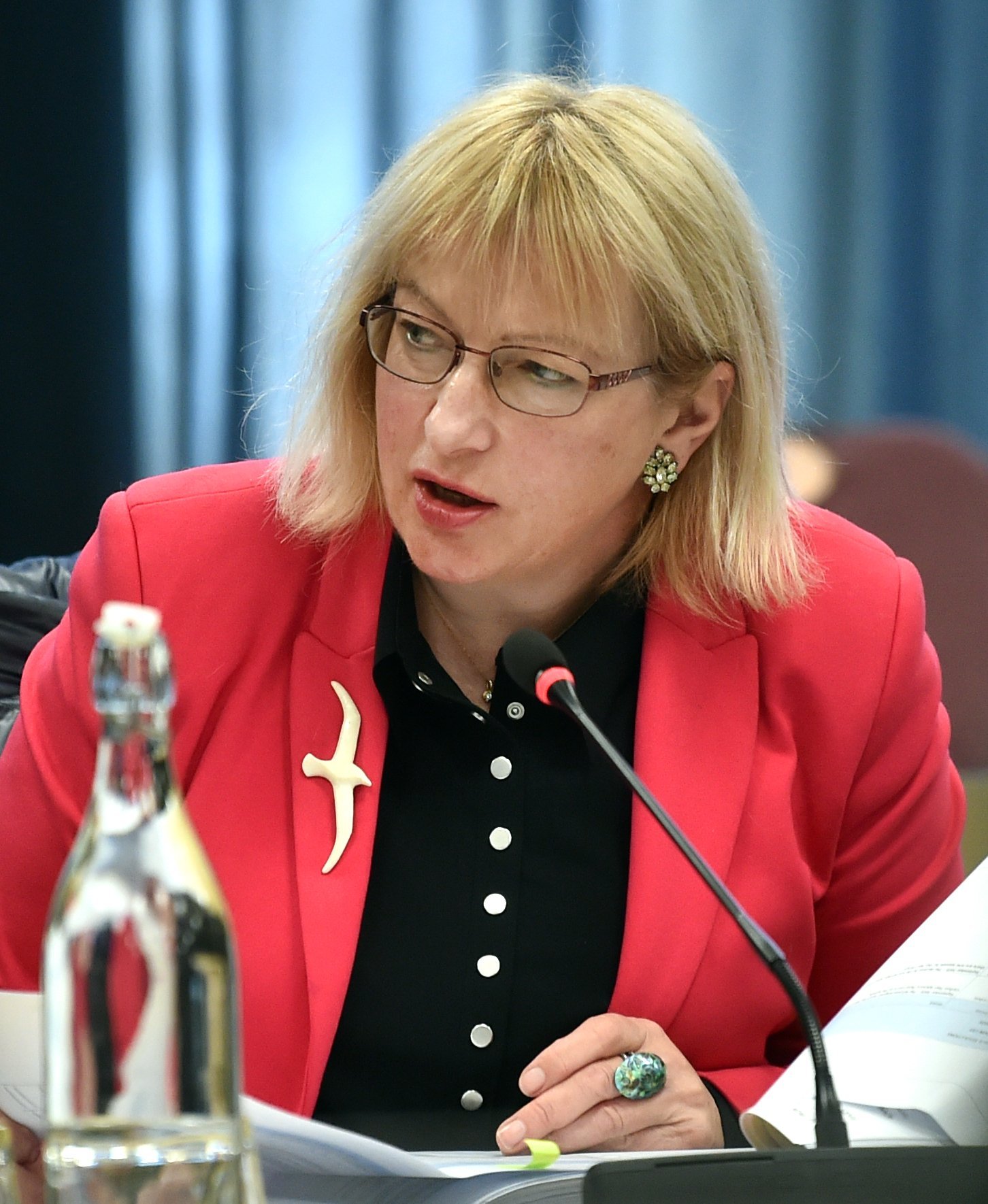
Authentic, approachable and determined.
That was Sophie Barker’s answer to a question about the kind of mayor she planned to be.
"I stood for a new style of leadership, because I’m quite inclusive ... I’m determined to get stuff done. I’ve got a list."
What is on her priority list?
Get the hospital sorted. Ms Barker expects continued advocacy could be required to ensure Dunedin gets a new hospital that is suitable.
Economic development.
"That’s a huge challenge," she said.
"And by working together, I believe that we can make the city rise."
Red carpet, rather than red tape.
Rebuilding relationships. Ms Barker advocated working in partnership with Business South, the University of Otago, Otago Polytechnic and mana whenua.
Lifting the city’s profile.
"Not just for visitors or consciousness — it’s also to get government funding."
Changing council culture and building trust.
"We’d like to lift the standard of council interactions."
Ms Barker, 58, was speaking on the ninth floor of Burns House in central Dunedin on Friday last week, a day after her mayoralty win was confirmed in the final results. The mayor’s office there is temporary and a move back to the Civic Centre is due next month, as the finishing touches are put on an upgrade.
The Otago Daily Times asked Ms Barker for a rundown about her time as mayor-elect.
On Saturday, October 11, she held a slim lead over her nearest rival, Andrew Simms, on progress results. The following night, she was relieved the preliminary count had been completed — her majority had been extended from 105 votes to 726.
"I’m in," she said in a text message to the ODT at 10pm.

On Monday and Tuesday last week, Ms Barker talked to every councillor about their aspirations. They had 30-minute slots. She has yet to determine the committee structure, responsibilities and where councillors might fit.
Monday morning was "utterly frantic", she said. She did two radio interviews before 8am. Her phone was going "bing bing bing bing" with messages. She sorted out the office and "tried to start some of the tech stuff". On Tuesday, there was a councillor-only breakfast, which was helpful to "start building those relationships".
The mayor-elect consulted her diary to see what her Wednesday looked like.
She met Business South representatives first thing, talked to a business publication and spent "a painful hour and a-half technology onboarding". She talked to Cr Lucas and Dunedin City Council chief executive Sandy Graham about such things as councillor induction, training and a meeting schedule to see out the year.
On Thursday, Ms Barker ended up having a larger role than expected at the ODT Class Act awards, which celebrate the excellence of young people in the southern region. It was her first official engagement since the election and Prime Minister Christopher Luxon had to leave early after the death of former prime minister Jim Bolger, she said.
"I got to give the certificates out and shake the hands of all of those amazing students," Ms Barker said.
"It was a lovely way to start."
Ms Barker talked over tourism matters with New Zealand Cruise Association chief executive Jacqui Lloyd, who is an old friend.
There was more engagement with high school students at the Young Enterprise Scheme Otago finals. The mayor-elect was one of the judges.
Thursday also included a trip to the vet, as follow-up care continued for one of her rescue cats, Flossie, after a Panadol pill saga. This sprang from a moment’s inattention, Ms Barker explained. Flossie "lives life through her tongue" and her quick decision to snaffle a Panadol pill a few weeks ago could have been fatal.
"It was all my fault for being so stupid, to leave it out, you know, with that naughty kitten," Ms Barker said.
"We didn’t need any more drama in the election period, quite frankly."
Flossie is now fine.
On Thursday evening, the final election results came through and Ms Barker’s majority was now 898 votes.
On the Friday, she had talked to people from Dunedin City Holdings, which oversees the council’s group of companies. She tried to organise her inbox.
She reflected on the weight of responsibility.
"I’ve had amazing interactions all week because people are so excited and especially young women," Ms Barker said.
"So there’s been a lot of young women that I’ve met who are very happy to have a female mayor."

Ms Barker started this week at "mayor’s school", which is run by Local Government New Zealand.
Did the girl who grew up at Larnach Castle on Otago Peninsula imagine she might one day be mayor? No. There was hard work to be done and little money around.
"I think we just thought about restoring the castle and where our next visitor was coming from."
She was a weekly boarder at Columba College in Dunedin.
"Girls can do anything" posters were up at the Presbyterian school.
"I was 12 years old when I went into the boarding house, and I was obviously a bit of a loner, and I’d grown up in the countryside, like many of the girls had grown up in the countryside, so it was quite challenging," Ms Barker said.
"I was the person that was allowed to get 10 books out of the library instead of four. Bit of a geek."
She described her mother, Margaret, as visionary — she could see the potential in a rundown castle and establishing gardens there.
Ms Barker had her daughter, Charlotte, in 2003 and worked in the council’s economic development unit from 2008 to 2015.
Adversity struck in 2010 when Ms Barker was diagnosed with a congenital brain problem. She had three operations in 16 months, two of which failed. She joined a march to keep neurosurgery services in Dunedin.
She saw her brain surgery as a gift.
"It certainly taught me resilience, plus how to be even more courageous and strong. If you have stared at death, weighed up odds and made tough decisions, I think it gives you a different outlook."
The road to recovery was long.
"The biggest lesson was the focus on making a difference with my life.
"I’m a lot more chill and philosophical now."
The previous term on the council, Ms Barker’s second, was a rollercoaster ride for her.
She was appointed deputy mayor by the new mayor, Jules Radich, but the partnership ended inside a year.
The breaking point came when Mr Radich had an ill-considered radio interview in which he minimised an incident of racism by a community board chairman. The mayor also breached meeting confidentiality.

Ms Barker said lodging the complaint was the right thing to do. It was about maintaining her integrity.
This led to her receiving a blizzard of incredulous text messages from another councillor, Carmen Houlahan, and the content was described by an investigator as unacceptable. This, too, was a breach of the code of conduct. The matter was distressing, but it was dealt with and the pair moved on, Ms Barker said.
Among the congratulatory texts on her mayoralty win was one from Mrs Houlahan, who was not re-elected to the council.
"Congrats Sophie, go girl power," it read.
Five of the 15 elected representatives for the council are women. Ms Barker was disappointed the number was not higher and added: "Can’t change the outcome of the election, you know?"
Some experienced councillors, including her former partner Dr O’Malley, did not make it back on. Ms Barker said he was a huge loss.
Six new councillors were elected.
Ms Barker said a range of perspectives at the table enabled better decision-making.
"I want us to have respectful relationships, but it’s a robust discussion and teasing out of things that makes those better decisions. So we aren’t going to agree all the time."
Her relationship with the chief executive should be fine, she said.
"The CEO is here to deliver what council wants."
Ms Barker described herself as practical and sensible — it was vital to have a plan and implement it, she said.
Asked about her political leanings, she said she saw this in terms of being oriented towards collectivism or individualism.
"I would lean left because, to do this, it is about people in our city."
However, she bristled at some social media commentary after the election that keeping a lid on rates would not happen under her watch.
"I am frugal and I will make the dollars sweat," she said.
Resources were limited, but there was a lot to do — "there will be some tough decisions along the way".
Ms Barker will be sworn into office next Friday.











